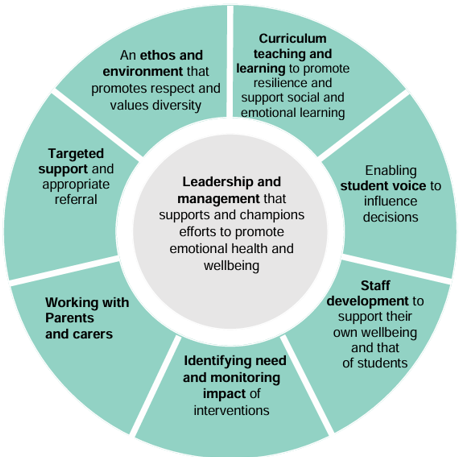Mental Health and Wellbeing Intent
‘’Mental health is a state of mental well-being that enables people to cope with the stresses of life, realise their abilities, learn well and work well, and contribute to their community. ‘’ (WHO, 2022)
At Altofts Junior School we believe that good mental health can lead to improved attainment, attendance, reductions in behaviour that challenges, as well as happier, more confident and resilient children and young people.
Moral Purpose
Altofts Junior School is committed to providing a calm, safe, inclusive and supportive environment to ensure all children have the best chance of thriving both academically and emotionally. As with our physical health, our mental health is not a fixed state and inevitably we will all have times of stress, worry, anxiety and trauma, which will have a negative impact on our mental health and wellbeing. Our school values and curriculum drivers provide a framework of tools for our children and young people to develop protective factors to support their own mental health and wellbeing. The importance of mental health and wellbeing for our children is reflected in our policies, curriculum, values and ethos.
Our Intent
We value and celebrate individuality and diversity, creating an environment where there is mutual respect and equal opportunities for all. We want to achieve a culture which challenges stigma around mental health and encourages each child or staff member to speak out about mental health in order to remove barriers that prevent people seeking help when needed.
Wellbeing Warriors
At Altofts Junior School, we believe that in order to achieve a mentally healthy school, the children’s voices need to be heard and reflected in the policies, procedures, interventions and strategies we use. To achieve this, we appoint a child from each class to advocate for their fellow classmates. These children are our ‘Wellbeing Warriors’ and their role is to bring about a positive change to their own, their peers and the staffs wellbeing by discussing and feeding back what children and staff need within school to feel happy, safe and to thrive.
Commitments
Pastoral team
Commit to:
- Abide to our school moto ‘Forward Together’, by working closely with children, teachers, parents, governors, education, health and social care services to ensure the individual needs of each child are met.
- Take a proactive approach to promoting positive mental health and wellbeing for the whole school.
- Early identification of mental health and wellbeing needs of our children, parents and staff.
- Implement evidence-based interventions to provide children with the skills to self-regulate and manage their own mental health and wellbeing. Evidence the impact of the interventions. Interventions consist of:
- ELSA (Emotional Literacy Support Assistant)
- Zones of Regulation
- Drawing and Talking therapy
- Friendship programs
- Monitor the attendance of all children and swiftly act on patterns suggesting emotional based school avoidance (EBSA), this may include attendance contracts, home visits, referral to Team around School or Future in Mind.
School staff
Commit to:
- Ensure the child is at the centre of what we do
- Use their skills and knowledge to recognise early indications of mental health and wellbeing concerns of our children and young people and to ensure these concerns are passed to the relevant team
- Have read and understood section one of Keeping Children Safe in Education (2024)
- Remember all behaviour is a form of communication and apply a trauma informed and relational approach to working with children.
- Ensure thorough understanding of our policies and procedures including but not limited to behaviour and SEMH.
- Treat everyone with courtesy, respect and understanding.
Parents
Commit to:
- Communicate with school about any worries or concerns regarding their child’s mental health and wellbeing.
- Attend meetings when required.
- Encouraged to attend parent sessions held by external agencies within school.
- Treat staff with courtesy, respect and understanding.
Senior Mental Health Lead:
Commit to:
- Oversee the whole-school approach to mental health
- Regularly review school practice to ensure Altofts continually meets the mental health and wellbeing needs of the children and staff, through prevention, identification and early support for children and training for staff to feel confident in identifying and dealing with poor mental health.
- Use the eight principles to promoting a whole school approach to mental health and wellbeing as our tool for ensuring that we have an effective approach to developing the mental health of all in our school community.









